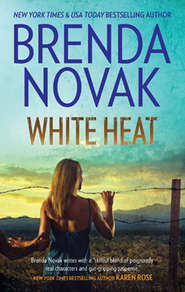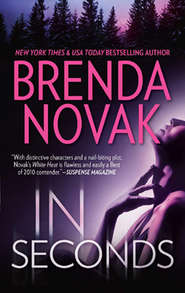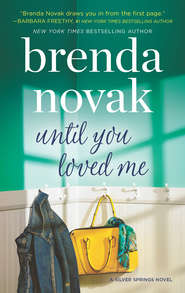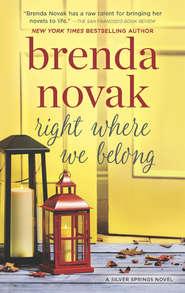По всем вопросам обращайтесь на: info@litportal.ru
(©) 2003-2025.
✖
Discovering You
Автор
Год написания книги
2019
Настройки чтения
Размер шрифта
Высота строк
Поля
Finally, the faint wailing of a siren drifted to her ears. “And this Natasha? She’s your...?” She knew better than to ask. It sounded as if she was probing, trying to learn whether he had a romantic interest. And yet she was too curious to let it go.
“Little sister. Actually, she’s my stepsister, ever since my father married her mother a few years ago.”
“I see. You have a big family,” she said to shift the focus away from the fact that she’d wanted to find out if Natasha was his girlfriend. “I think I’ve seen your father and stepmother. Are they living with you, too?”
“For now. It was supposed to be a temporary arrangement, but it’s been a couple of years and they don’t seem too eager to leave.”
“You’ve got a big house. Having them there wouldn’t be too bad if they’re helping with the mortgage.”
“They aren’t.”
“Then I could see how it might be an imposition.”
His gaze slid over her, taking in every detail of her long, slinky black dress—including the slit up her leg. “What’s your story?”
She cleared her throat. “I’m an only child.”
“From the city?”
“What makes you think I’m from the city?”
“That dress,” he replied. “Women around here don’t wear that type of thing very often.”
“I was born and raised in Oakland.” She’d been living in San Francisco since her marriage to Charlie, however. An art exhibit in the city was a fancy affair. She knew she was overdressed for the small towns along Highway 49, but she’d felt the need to clean up, to feel attractive again, the way she used to feel when Charlie took her out.
“And now you live alone in Whiskey Creek, except for your little girl,” he said.
She stiffened in surprise. “How’d you know I have a little girl?”
“I saw a photograph of her in your car the other day.”
“Oh.” She smiled at the thought of her five-year-old daughter. She missed Cassia so much.
He waited for her to look him in the face again. “Is she staying with her father right now, or...”
“She’s with her grandparents. They offered to keep her until I could get settled.” And because they missed Charlie as much as she did, India had felt obliged to allow it.
There were other reasons she’d felt she had to let Cassia stay with the Sommerses, but those reasons made her stomach churn.
Rod stuffed his hands in his pockets. “So where’s your husband?”
She refused to flinch despite the sting that question caused. “Not everyone who has a child has a husband.”
He raised his eyebrows. “You’re wearing a ring.”
It’d been so long since she’d been anyplace a man might bother to ask, she hadn’t even remembered, probably because her ring didn’t mean what it was supposed to. Not anymore. Charlie was dead. She’d sold their lovely home because she could no longer bear to live there. She couldn’t divest herself of her ring, too. That symbol of his love meant too much to her. Besides her mother, he was the only person who’d ever treated her as though she mattered, as though she was special enough to deserve any kind of devotion. She’d since figured out that was a reflection of her own self-esteem at the time, but he’d somehow been able to look beyond that to see what she could be, to help shape her into what she was today.
“Right. My ring,” she said. “Of course. But—” she stared down at her 1.5 carat diamond, remembering the night Charlie had given it to her “—my husband’s...gone.”
Fortunately, a truck came from the direction of the bar, interrupting their conversation before Rod could follow up on that. Two men rode in the cab, both of whom knew Rod.
The driver stopped and lowered his window, and the passenger called out to him. “What’s going on, man? You okay?”
They exchanged a few words. Then the guys in the truck asked if Rod needed any help and Rod phoned his brother to say he could send his bike home with Donald and Sam. By the time the three of them had used a wooden plank to roll the heavy motorcycle up and into the bed, a policeman arrived—Chief Bennett, according to his name tag.
“Stand back,” he told them, pushing them even farther to one side of the road. “I’ll talk to you once I get some flares out so no one else gets hurt.”
The ambulance came just as Rod’s friends drove off with his bike. India watched from about ten feet away while two paramedics knelt by the man on the ground and Chief Bennett gave Rod a sobriety test—which, thankfully, he passed.
India hated to interrupt the paramedics, but they were beginning to load the injured man into the ambulance and she hoped to get some word of his condition before they left. “Is he going to be okay?”
“Most likely,” one of them replied. “Even minor head injuries bleed a lot. I think he’ll be fine.”
“He was an idiot to pick a fight with Rod Amos,” the other paramedic piped up.
The first guy jerked his head at the wallet resting on the unconscious man’s chest, which Chief Bennett had used to ID him. “Liam Crockett’s from Dixon. Mustn’t have heard.”
India wanted to ask if Rod was a professional fighter, but they were in too much of a hurry, so she backed away and let them go.
Ever since the police chief had determined that Rod was sober, Bennett had been grilling him on how everything had happened. They were still talking, and India didn’t know whether to get in her car and leave, or wait to see if Rod needed a ride home.
“Damn it, Rod,” she heard the police chief say. “You are so damn wild. It’s always something with you.”
Rod was obviously not pleased by that reaction. “I told you. He started it.”
“Yeah, well, we’ll see if that’s what he says.”
“You saw my bike! How do you think it got wrecked?”
When Bennett refused to commit himself, Rod continued. “We could’ve settled our differences at the bar. Instead, he followed me and tried to run me off the road. What kind of pussy tries to run someone over instead of fighting like a man?”
“Wait. What do you mean, handle it at the bar?” Bennett said. “You bust up Sexy Sadie’s again, you won’t be allowed to go there anymore.”
“What are you talking about?” Rod cried. “I’ve never busted up Sexy Sadie’s! You can’t hold me accountable for what my brothers do.”
“One of you is always raising hell,” he said in disgust. “Anyway, I’m going to look into this further. That I can promise you.”
“Fine,” Rod told him. “I hope you do. When that bastard wakes up, he should go to jail.”
“If he wakes up,” the police chief grumbled. “God, I’m exhausted. Do you need a ride or—” He looked at India, obviously hoping she’d relieve him of that duty.
“I can take him,” she volunteered. “I’m going that way.”
“Maybe you should drive him over to the hospital first,” he said, “see if he has any broken bones or needs stitches. It shouldn’t take long. They’ve got to be on a first-name basis with him by now.”
Rod shot him a dark scowl. “Quit trying to make me look bad.”
“I don’t need to try,” Bennett said. “Since you can’t stay out of trouble, you make yourself look bad.”











